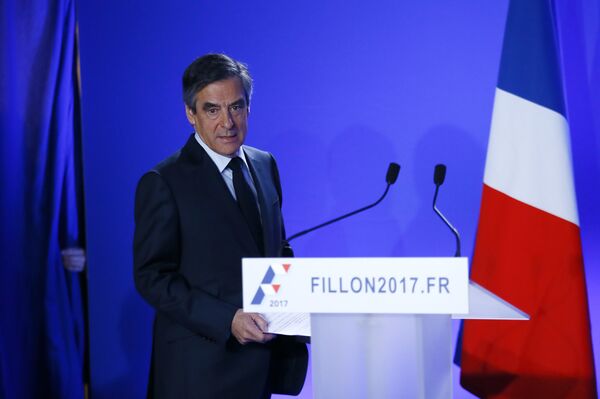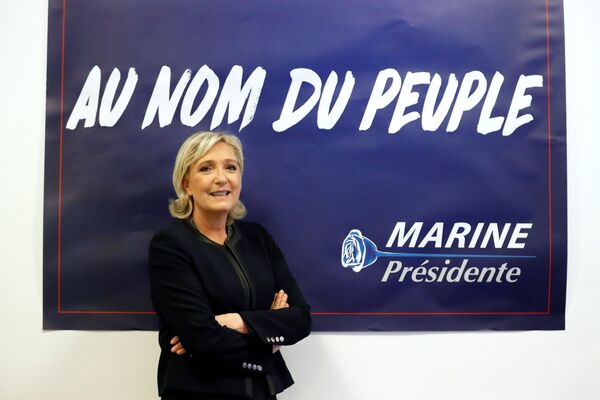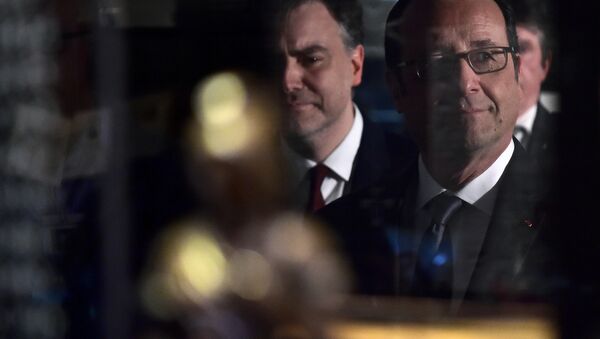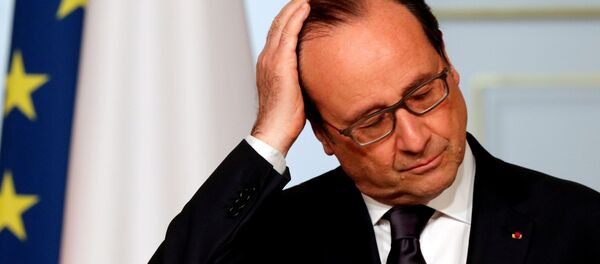In an interview with local media, Hollande suggested that if the far-right Le Pen won the April 23 election, it would push France out of the bloc, and threaten its continued survival.
"It is the aim of all populists to leave Europe, to close off from the world and imagine a future surrounded by barriers of all kinds and borders defended by look-out posts. My last duty is to do everything possible so that France is not convinced by such a project. The threat exists because the extreme right hasn't done so well for more than 30 years — but France won't give in," Hollande said.
The outgoing president chose not to contest the election due to low approval ratings.
Despite her campaign being rocked by several scandals, polls show Le Pen has widened her lead over centrist contender Emmanuel Macron. There are even suggestions the EU's decision to revoke Marine Le Pen's parliamentary immunity, so France can charge her with disseminating violent images, could add to her popularity.
Latest #France poll. Le Pen 27%, Macron 24%, Fillon 19% in 1st round. Macron seen defeating Le Pen 60-40% in 2nd round, Fillon Le Pen 56-44% pic.twitter.com/zXf097cIQz
— Holger Zschaepitz (@Schuldensuehner) March 6, 2017
Her rising ratings are also attributable to the collapse of Republican candidate Francois Fillon's campaign. Fillon began hemorrhaging public support over a fake job scandal that broke out in late January — his wife is alleged to have been paid from state funds for jobs without actually fulfilling any duties. Surveys indicate over two-thirds of French voters want Fillon to withdraw from the race as a result.

Despite polls indicating former French Prime Minister Alain Juppe, who lost to Fillon in the second round of the Republican primaries in November 2016, would come ahead of Le Pen and Macron if the party adopted him instead, Fillon has vowed to continue.
Nonetheless, former President Nicolas Sarkozy has suggested Monday, March 6, the two should meet to discuss the possible solution to the crisis
"Faced with the gravity of the situation, everyone should do whatever it takes to preserve unity, which is a condition for changeover. Our division will give rise to the extreme right. It is in this spirit I propose Fillon and Juppe meet to find a decent and credible way out of the situation that cannot last anymore," Sarkozy said in a statement.
Sarkozy calls for a Fillon-Juppe meeting that wll reach a way out of a grave situation that shd not continue any longer.#présidentielle2017
— Yannis Koutsomitis (@YanniKouts) March 6, 2017
However, Hollande's comments have provoked condemnation in some quarters.
On Twitter, Russian senator Alexei Pushkov asked why Hollande viewed the prospect of Le Pen gaining power via democratic means posed a threat.
"Won't her victory as a legitimate candidate be a manifestation of the will of the people?" Pushkov asked.
Оланд заявил об "угрозе"победы Ле Пен на выборах.Почему же угроза? Разве ее победа как законного кандидата не станет проявление воли народа?
— Алексей Пушков (@Alexey_Pushkov) March 6, 2017
Moreover, Gino Raymond, Professor of Modern French Studies at the University of Bristol, says the "threat" of a Le Pen victory is overblown.
"Le Pen will win the first round, but that's due to the way France's electoral system operates. However, most people agree in the second round 'republican discipline' will assert itself, and democratic sentiment in France will lead the majority of French voters to vote for the anti-Le Pen candidate," Professor Raymond told Sputnik.

Such an eventuality is not without precedent, he notes. Le Pen's father made it to the final round of the presidential election in 2002, which produced a "massive landslide" in favor of Jacques Chirac. What then accounts for Hollande's apparent anxiety? Professor Raymond suggests he be concerned with trying to scrape a positive legacy.
"Hollande will go down as the anonymous President. He campaigned as 'Mr. Normal', but ultimately failed to distinguish himself and failed his key pledge to bring down unemployment. He's attempting to rally the divided, fractured Socialist party in France — after the presidential election, there are legislative elections. His warning is a way of restoring a rather tarnished image of his presidency. He could even be positioning himself for a role in Brussels after his resignation, hence his positioning of himself as the defender of Europe," Professor Raymond added.



